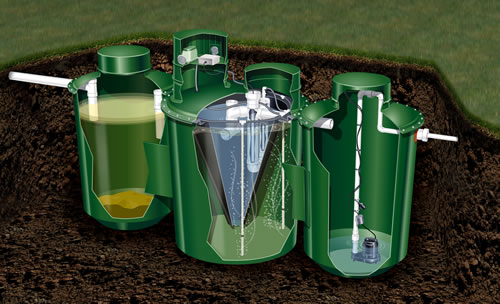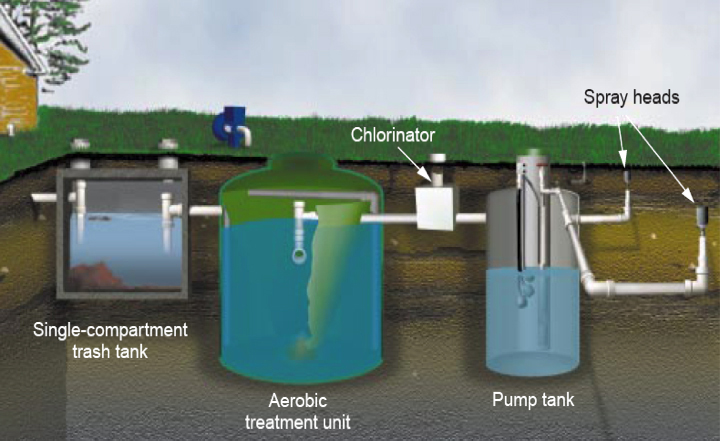If you’re in the market for a septic system, it’s crucial to weigh the pros and cons of above ground aerobic septic systems. These systems offer a viable alternative to traditional septic tanks, providing numerous benefits such as enhanced treatment efficiency and minimized environmental impact. However, they also come with their fair share of drawbacks, including higher maintenance requirements and potential noise concerns. By understanding the advantages and disadvantages of above ground aerobic septic systems, you can make an informed decision when it comes to choosing the best option for your property.
Increased Treatment Efficiency
Elimination of Anaerobic Conditions
Above-ground aerobic septic systems offer increased treatment efficiency compared to traditional anaerobic systems. Anaerobic conditions in septic systems can lead to reduced decomposition rates and nutrient removal, resulting in the accumulation of solids and unpleasant odors. By providing an aerobic environment, above-ground systems promote the growth of aerobic bacteria, which are more efficient at breaking down organic matter and reducing the concentration of harmful pathogens.
Enhanced Decomposition and Nutrient Removal
One of the key advantages of above-ground aerobic septic systems is their ability to enhance decomposition and nutrient removal. The presence of oxygen in the system facilitates the growth of aerobic bacteria, which are highly effective at decomposing organic waste and converting it into simpler, less harmful compounds. This process not only reduces the volume of waste but also ensures the removal of nutrients such as nitrogen and phosphorus, which can be detrimental if released into the environment.
Effective Treatment of High-Load Wastewater
Above-ground aerobic septic systems are well-suited for treating high-load wastewater, making them an ideal option for large families or commercial buildings. These systems can efficiently handle a higher volume of wastewater and accommodate seasonal fluctuations in usage. Their ability to process high-strength waste ensures effective treatment and prevents the overload of the system, leading to better overall performance and longevity.
Lower Risk of Contamination
Reduced Chance of Groundwater Contamination
Above-ground aerobic septic systems significantly reduce the risk of groundwater contamination compared to traditional septic systems. The aerobic treatment process eliminates harmful pathogens and reduces the concentration of pollutants, preventing them from seeping into the underlying groundwater. This is particularly crucial in areas with vulnerable water sources or where the groundwater is used for drinking purposes.
Less Surface Water Pollution
Another advantage of above-ground aerobic systems is their contribution to reducing surface water pollution. By promoting efficient decomposition and nutrient removal, these systems prevent the discharge of untreated or poorly treated wastewater into nearby rivers, lakes, or streams. This helps to maintain a healthy aquatic ecosystem and ensures the safety of recreational water activities for both humans and wildlife.
Minimal Risk of Soil Saturation
Unlike traditional septic systems, above-ground aerobic septic systems carry minimal risk of soil saturation. The enhanced treatment efficiency of these systems reduces the volume of wastewater that needs to be discharged into the soil. This significantly lowers the chances of overloading the soil’s capacity to absorb and filter the effluent properly. As a result, the risk of saturated soil, which can lead to foul odors, wastewater backup, and potential damage to the environment, is significantly minimized.
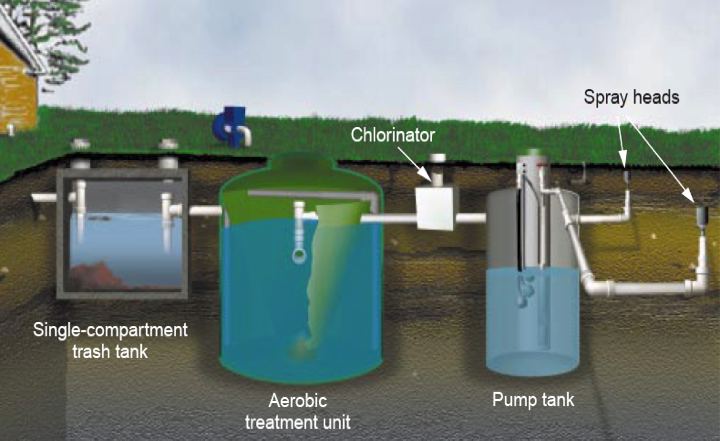
Ease of Installation
No Requirement for Deep Excavation
One of the significant advantages of above-ground aerobic septic systems is that they do not require deep excavation during installation. Unlike traditional septic systems, which involve extensive digging and disruption to the landscape, above-ground systems can be easily installed without the need for large excavations. This not only saves time and labor but also minimizes the impact on surrounding vegetation and structures.
More Flexible Placement Options
Above-ground aerobic septic systems offer greater flexibility in terms of placement options. They can be installed above the ground, making them ideal for properties with challenging soil conditions or limited available space. These systems can be strategically positioned to minimize the visual impact and ensure easy access for maintenance and inspection purposes. This flexibility in placement options enhances the versatility of above-ground systems and accommodates various property layouts.
Potential Cost Savings
The ease of installation associated with above-ground aerobic septic systems can result in potential cost savings. The absence of deep excavation and extensive labor reduces the overall installation expenses. Additionally, the flexibility in placement options can eliminate the need for costly modifications to the property’s landscape or infrastructure. These cost-saving benefits make above-ground aerobic septic systems an attractive option for homeowners and property owners looking for efficient and budget-friendly wastewater treatment solutions.
Lower Maintenance Needs
Extended Pumping Intervals
Above-ground aerobic septic systems generally require less frequent pumping compared to traditional septic systems. The efficient decomposition and nutrient removal processes result in decreased accumulation of solids in the system. This translates to extended pumping intervals, reducing the frequency and associated costs of maintenance tasks. The reduced maintenance needs make above-ground systems a convenient and hassle-free option for homeowners.
Less Frequent Sludge Removal
The enhanced decomposition capabilities of above-ground aerobic septic systems also contribute to less frequent sludge removal. The aerobic bacteria thrive in the system, breaking down organic matter more efficiently and reducing the formation of sludge. This results in fewer instances of sludge buildup, minimizing the need for regular removal and disposal. The reduction in sludge removal requirements simplifies maintenance procedures, saving time and effort.
Simplified Maintenance Procedures
Above-ground aerobic septic systems offer simplified maintenance procedures compared to traditional septic systems. The absence of anaerobic conditions and the use of aerobic bacteria significantly reduce the chances of system failures and complications. Routine maintenance typically involves inspections of pumps and filters, ensuring their proper functioning. Additionally, periodic sampling and testing of the effluent quality help to ensure ongoing system efficiency. The simplified maintenance procedures associated with above-ground systems make them an appealing choice for homeowners seeking hassle-free wastewater treatment solutions.
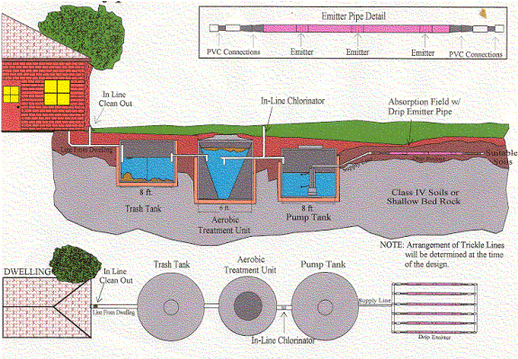
Improved Odor Control
Aerobic Environment Reduces Odor
One of the primary advantages of above-ground aerobic systems is their ability to control unpleasant odors commonly associated with septic systems. The aerobic environment created in these systems supports the growth of aerobic bacteria, which eliminate foul-smelling gases produced during the decomposition process. As a result, above-ground systems emit significantly fewer odors, creating a more pleasant environment for homeowners and their neighbors.
Use of Aerobic Bacteria
Above-ground aerobic septic systems harness the power of aerobic bacteria to improve odor control. These bacteria thrive in the presence of oxygen and are highly efficient at breaking down organic matter and eliminating odorous gases. By utilizing aerobic bacteria, above-ground systems effectively neutralize and prevent the release of foul odors, contributing to a more enjoyable living environment for homeowners.
Prevention of Sulfur Compounds
The aerobic treatment process in above-ground septic systems helps prevent the formation and release of sulfur compounds, which are responsible for unpleasant smells. These compounds, such as hydrogen sulfide, are commonly associated with anaerobic septic systems and can create a foul odor throughout the property. Above-ground aerobic systems effectively prevent the production of sulfur compounds, ensuring a fresh and odor-free environment for homeowners.
Ability to Handle High-Volume Wastewater
Suitable for Large Families or Commercial Buildings
Above-ground aerobic septic systems are an excellent choice for properties with high-volume wastewater needs, such as large families or commercial buildings. These systems are designed to efficiently process larger quantities of wastewater, ensuring effective treatment and preventing overloading. By accommodating high-volume wastewater, above-ground systems provide a reliable and robust solution for properties with increased wastewater demands.
Accommodation of Seasonal Fluctuations
Another advantage of above-ground aerobic septic systems is their ability to accommodate seasonal fluctuations in wastewater usage. Properties that experience varying levels of wastewater production throughout the year, such as vacation homes or commercial establishments, can benefit from the flexibility and efficiency offered by these systems. They can handle increased wastewater flow during peak periods without compromising the treatment process or risking system failures.
Higher Loading Rates
Above-ground aerobic septic systems are designed to handle higher loading rates compared to traditional septic systems. Their efficient treatment processes and reliance on aerobic bacteria allow them to process wastewater at a faster rate, ensuring effective treatment even during periods of increased usage. This higher loading capacity makes above-ground systems a reliable option for properties with heavier wastewater demands, minimizing the risk of system overload and ensuring consistent performance.
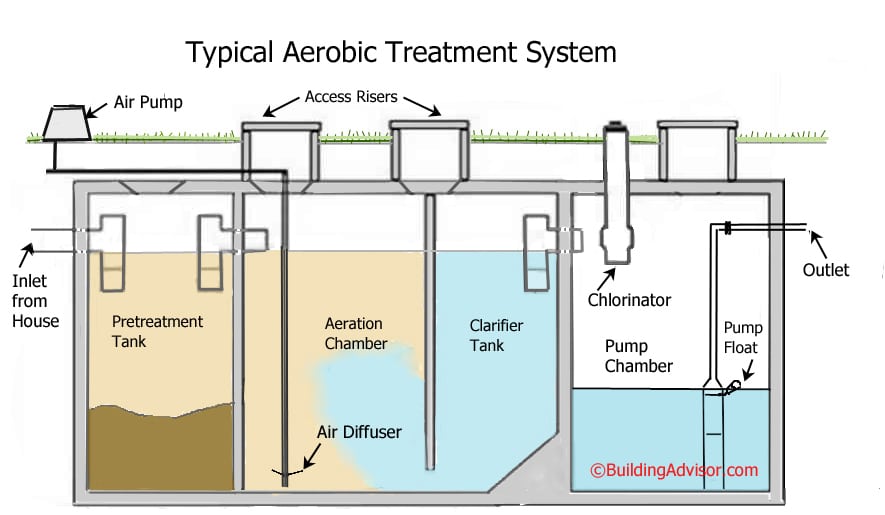
Reduced Space Requirements
No Need for Large Drain Fields
Unlike traditional septic systems that rely on extensive drain fields, above-ground aerobic septic systems eliminate the need for large drain fields altogether. These systems treat wastewater more efficiently within a compact above-ground unit, minimizing the space required for installation. The absence of large drain fields preserves the landscape and opens up possibilities for properties with limited space, making above-ground systems a convenient and space-saving choice.
Compact Above Ground System Design
Above-ground aerobic septic systems feature a compact and space-efficient design. The treatment unit is installed above the ground, reducing the footprint required for system installation. This compact design ensures minimal disturbance to the property’s landscape and allows for easy integration into existing structures. The compactness of above-ground systems not only saves space but also enhances their overall aesthetic appeal.
Preservation of Landscaping
One of the significant advantages of above-ground aerobic septic systems is the preservation of landscaping. Traditional septic systems often necessitate extensive excavation and disrupt the vegetation and structures present on the property. Above-ground systems, on the other hand, minimize the impact on the landscape, maintaining the integrity of existing gardens, lawns, and outdoor spaces. This preservation of landscaping is highly valued by homeowners seeking to maintain the visual appeal and functionality of their outdoor areas.
Enhanced Treatment of Difficult Wastes
Suitable for Homes with Certain Appliances
Above-ground aerobic septic systems excel in handling difficult wastes commonly found in homes with specific appliances. For example, homes with garbage disposals often generate organic waste with high fat and oil content, which can challenge the treatment capabilities of traditional septic systems. Above-ground aerobic systems effectively break down fats, oils, and other challenging waste due to their reliance on aerobic bacteria. This ensures efficient treatment and minimizes the risk of clogged pipes or system failures.
Effective in Treating Chemicals and Pharmaceuticals
Above-ground aerobic septic systems are also effective in treating wastewater containing chemicals and pharmaceuticals. Traditional septic systems may have limitations in processing these substances, leading to the release of potentially harmful compounds into the environment. The enhanced treatment efficiency of above-ground systems allows for improved breakdown and removal of chemicals and pharmaceuticals, ensuring the protection of water sources and ecosystems.
Improved Breakdown of Fats and Oils
The presence of aerobic bacteria in above-ground septic systems significantly improves the breakdown of fats and oils. These substances, common in household wastewater, can contribute to clogs and system failures if not adequately treated. Above-ground aerobic systems provide an ideal environment for aerobic bacteria to thrive and efficiently decompose fats and oils, mitigating the risk of blockages and promoting smooth system operation.
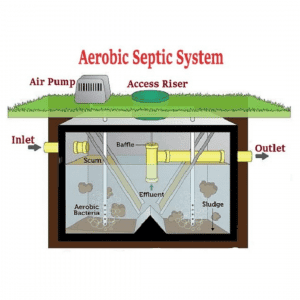
Longevity and Durability
Resistant to Corrosion
Above-ground aerobic septic systems are designed with materials that are resistant to corrosion. Unlike traditional septic systems, which may be susceptible to deterioration over time due to exposure to corrosive substances in wastewater, above-ground systems ensure greater longevity and durability. The corrosion-resistant materials used in their construction protect the system from damage and maintain its structural integrity, reducing the need for premature replacements or repairs.
Sturdy Construction Materials
The construction materials used in above-ground aerobic septic systems are chosen for their strength and durability. These systems are designed to withstand various environmental conditions and potential impacts, ensuring long-lasting performance. The use of sturdy construction materials adds an extra layer of reliability, allowing above-ground systems to function effectively for extended periods without experiencing structural failures.
Long Lifespan with Proper Maintenance
When maintained properly, above-ground aerobic septic systems have a long lifespan. Routine maintenance tasks, such as regular inspections, pumping, and sampling, help ensure the system’s proper functioning and identify any potential issues early on. With proper care and attention, above-ground systems can last for decades, providing reliable wastewater treatment and avoiding costly replacements or significant repairs. Homeowners can enjoy peace of mind knowing that their above-ground system is built to last.
Need for Professional Maintenance
Regular Service Visits
To ensure optimal performance, above-ground aerobic septic systems require regular service visits by trained professionals. These visits typically include inspections of the system components, checking for any signs of damage or malfunction. Professionals can also assess the efficiency of the treatment process and provide recommendations for maintenance or repairs. Regular service visits are essential in identifying and addressing any potential issues before they escalate, maximizing the system’s lifespan and efficiency.
Pump and Filter Inspections
During maintenance visits, professionals inspect and assess the condition of pumps and filters within above-ground aerobic septic systems. These components play a critical role in the system’s functioning and need to be inspected for any signs of wear, clogs, or malfunctions. Regular inspections and maintenance of pumps and filters help ensure their proper operation, preventing costly breakdowns and minimizing the risk of system failures.
Routine Sampling and Testing
Professionals conducting maintenance visits for above-ground aerobic septic systems also perform routine sampling and testing of the effluent quality. This involves collecting samples of the treated wastewater and analyzing them for various indicators of treatment efficiency and water quality. Routine sampling and testing provide valuable data on the system’s performance and allow for the early detection of any potential issues. By monitoring the effluent quality, professionals can ensure that the system is operating at optimal levels and make any necessary adjustments or recommendations.
In conclusion, above-ground aerobic septic systems offer numerous advantages over traditional septic systems. They provide increased treatment efficiency, lower the risk of contamination, and offer ease of installation with potential cost savings. These systems also require less maintenance, improve odor control, and can handle high-volume wastewater. Additionally, they reduce space requirements, enhance treatment of difficult wastes, and possess longevity and durability with proper maintenance. However, it is important to note that above-ground aerobic septic systems require professional maintenance, including regular service visits, pump and filter inspections, and routine sampling and testing. By considering these factors, homeowners can make informed decisions about implementing above-ground aerobic septic systems as sustainable and effective solutions for their wastewater treatment needs.
